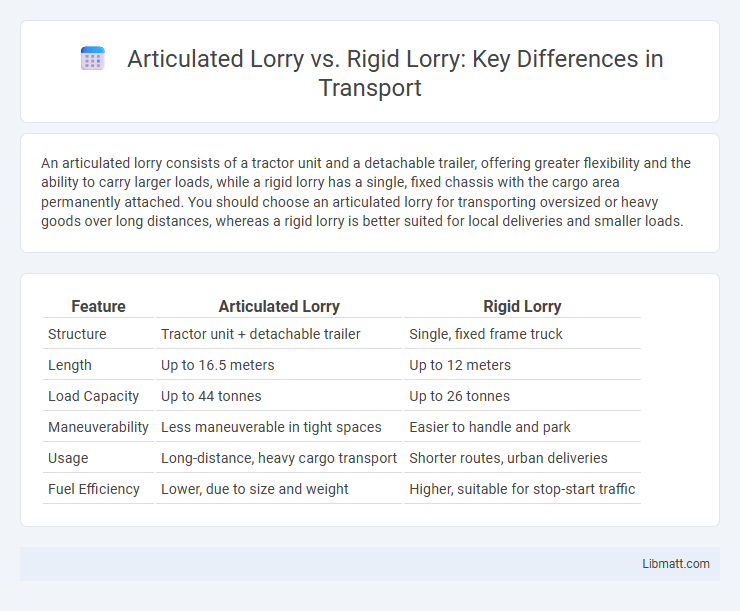An articulated lorry consists of a tractor unit and a detachable trailer, offering greater flexibility and the ability to carry larger loads, while a rigid lorry has a single, fixed chassis with the cargo area permanently attached. You should choose an articulated lorry for transporting oversized or heavy goods over long distances, whereas a rigid lorry is better suited for local deliveries and smaller loads.
Table of Comparison
| Feature | Articulated Lorry | Rigid Lorry |
|---|---|---|
| Structure | Tractor unit + detachable trailer | Single, fixed frame truck |
| Length | Up to 16.5 meters | Up to 12 meters |
| Load Capacity | Up to 44 tonnes | Up to 26 tonnes |
| Maneuverability | Less maneuverable in tight spaces | Easier to handle and park |
| Usage | Long-distance, heavy cargo transport | Shorter routes, urban deliveries |
| Fuel Efficiency | Lower, due to size and weight | Higher, suitable for stop-start traffic |
Introduction to Articulated and Rigid Lorries
Articulated lorries consist of a towing vehicle and a separate trailer connected by a pivot joint, allowing greater maneuverability and load capacity. Rigid lorries have a single, fixed chassis where the cargo area and cab are integrated, making them ideal for shorter, urban deliveries. The choice between articulated and rigid lorries depends on factors such as cargo size, route requirements, and operational flexibility.
Key Differences Between Articulated and Rigid Lorries
Articulated lorries consist of a tractor unit and a separate trailer connected by a pivot, enabling greater maneuverability and higher load capacity compared to rigid lorries, which have a fixed chassis with an integrated cab and cargo area. Articulated lorries are ideal for transporting long or bulky goods over longer distances, while rigid lorries suit shorter routes and urban deliveries due to their compact size and easier handling. The key differences revolve around flexibility, payload capacity, and operational contexts, with articulated lorries offering superior versatility for heavy-duty logistics.
Design and Construction Comparison
Articulated lorries feature a tractor unit connected to a separate trailer, allowing enhanced flexibility and greater load capacity compared to rigid lorries, which have a single, integrated chassis and cargo area. The design of articulated lorries includes a fifth-wheel coupling that facilitates turning and maneuverability, whereas rigid lorries rely on a fixed frame, limiting their hauling capabilities and maneuverability. Construction materials for both types emphasize durability and weight optimization, but articulated vehicles often incorporate reinforced coupling systems to handle dynamic stresses between the tractor and trailer.
Load Capacity and Flexibility
Articulated lorries offer greater load capacity due to their detachable trailer, allowing you to transport larger and more varied cargo compared to rigid lorries. Rigid lorries have a fixed chassis and are typically limited in volume and weight, making them better suited for smaller, more consistent loads. Choosing between the two depends on whether your logistics require maximum flexibility in load size or straightforward transportation of moderate loads.
Maneuverability and Accessibility
Articulated lorries offer superior maneuverability due to their pivot joint, allowing tighter turns and easier navigation in confined urban environments compared to rigid lorries. Rigid lorries, with a fixed chassis, provide better stability on uneven terrain but lack the flexibility needed for narrow streets or sharp corners. Accessibility in tight spaces favors articulated lorries, especially for deliveries in congested city centers or complex loading docks.
Fuel Efficiency and Emissions
Articulated lorries typically have lower fuel efficiency compared to rigid lorries due to their larger size and heavier payload capacity, resulting in higher fuel consumption per mile. However, rigid lorries, being smaller and less versatile, often emit fewer greenhouse gases on shorter routes and urban deliveries. Advances in aerodynamic design and engine technology are gradually narrowing the emissions gap between these two types of commercial vehicles.
Typical Usage Scenarios
Articulated lorries excel in transporting heavy loads over long distances due to their flexible design and larger cargo capacity that suits highways and intercity routes. Rigid lorries are ideal for urban deliveries and short-haul trips where maneuverability and ease of access to tight spaces are crucial. Your choice depends on whether you prioritize cargo volume and range or require efficient navigation in congested city environments.
Pros and Cons of Articulated Lorries
Articulated lorries offer superior maneuverability and increased cargo capacity due to their separate trailer, making them ideal for long-distance transport and flexible loading options. However, they require more skill to drive, have higher maintenance costs, and face restrictions in certain urban areas due to their longer length. Their ability to detach the trailer provides logistical advantages but can complicate parking and increase the risk of jackknifing accidents.
Pros and Cons of Rigid Lorries
Rigid lorries offer enhanced maneuverability and easier handling in urban environments due to their fixed chassis design, making them ideal for shorter delivery routes and tight spaces. However, their limited cargo capacity compared to articulated lorries can restrict the volume of goods transported per trip, potentially increasing the number of journeys needed. Your choice depends on balancing the need for flexibility in congested areas against the efficiency of larger load capacities.
Which Lorry Type is Best for Your Needs?
Choosing between an articulated lorry and a rigid lorry depends on your cargo volume and route requirements. Articulated lorries offer greater load capacity and flexibility for long-distance, heavy-duty transport, while rigid lorries suit urban deliveries and shorter distances with easier maneuverability. Assess factors like cargo size, delivery frequency, and road conditions to determine the lorry type that maximizes efficiency and cost-effectiveness for your business.
articulated lorry vs rigid lorry Infographic

 libmatt.com
libmatt.com